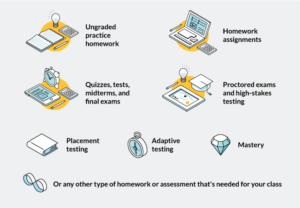Student homework and assessment has changed. In this age, new technologies are constantly evolving or being introduced to assist content authors, instructors, and educators with this task. A question that is often asked is whether online student assessments are different from assessments designed for in-person classes. Moreover, which tools should be used to change our approach to assessments, improve the online experience, and provide unique and creative ways in science, technology, engineering, and mathematics (STEM)-based online homework and assessment are also of interest.
Indeed, creating STEM homework and assessments for students to complete in an online environment requires effective, meaningful, well-constructed, and learner-centered assessment design. Having this will help students gear up for success by challenging them to apply their knowledge to answer questions, solve problems, and communicate to the instructor whether or not they have successfully learned the STEM concepts being taught. In this article, we will talk about how Möbius by DigitalEd is a must-have for educators to effectively deliver online homework and assessments as they guide their STEM students through their academic journey.
Möbius by DigitalEd provides the most robust and comprehensive online homework and assessment solution for STEM classes which enhances the ability of students to practice and demonstrate their skills effectively.This assessment tool provides the ability to create questions algorithmically, meaning educators create a single question and Möbius algorithmically generates different values of the same question, providing students with learning support and an opportunity to practice based on their level of understanding. With Möbius assignments, educators can tailor their class’s homework and assessment to fit their teaching style. Möbius offers unlimited question authoring potential and customization with over 50 adjustable properties, letting educators configure their assessments in whatever form that best suits them. This can range from proctored exams, high stakes testing, ungraded practice homework, quizzes and much more.

Möbius lets educators save time while designing homework or assessments by using its intuitive Assignment Editor. The editor offers properties such as time limits, permitted number of attempts, passing score, and scheduling options to choose when and for how long students can access assignments. Möbius’ powerful assessment capabilities provide students with an abundance of instant and customizable feedback. Educators can customize what hints students receive both during and after completing their assignments. Möbius assignments provide personalized learning experiences by creating custom access criteria for each Möbius assignment. It provides a secure testing environment to guarantee assessment integrity, and the advantage of Policy Sets to consistently apply a defined subset of assignment properties in bulk without needing to adjust individual assignments manually.
The Möbius Gradebook and analytics provide streamlined data insights with automatic grading to report how students have performed on their homework and assessments. These tools help to collect information on the amount of time taken to answer questions, the actual answers entered, and for any inline exercise, one can tell whether students attempted them and checked their answers. The data collected thus provides extra insights into how the class is performing at individual exercises and helps in their learning journey. In a session presented at Mathfest 2021, Louise Krmpotic, Vice President, Educational Enterprise at DigitalEd explains the importance of authentic assessment and shows examples of how the Möbius platform enables educational institutions to access more of Bloom’s Taxonomy, including analysis and creation. The entire webinar can be watched here.
